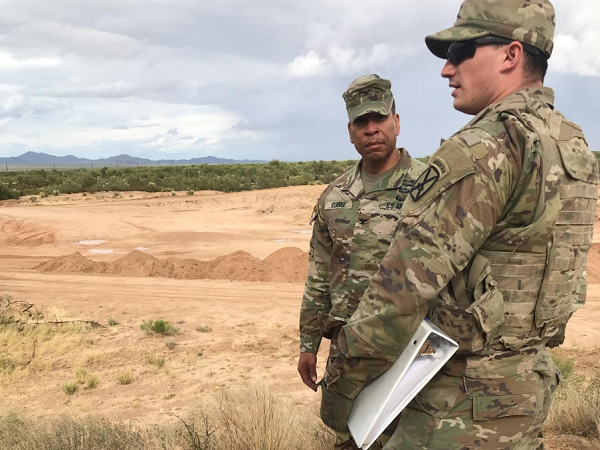When joining the Army you may be overwhelmed by the number of career choices.
While there are slightly fewer Army Officer choices than Enlisted career options, there are still over 100 to choose from.
Consider picking wisely, as you will spend years of your life studying, learning, and working in this career field.
It is best to find a career that you not only find interesting but has a civilian job equivalent where your skills and experience will place you above other candidates.
The last thing you want to do is spend multiple years of your life mastering a skill just to leave the Army and have to start a new career because your job duties do not transfer to a civilian career with equal pay or responsibility.
This article will cover seven of the best Army Officer jobs, compare/contrast them to similar Enlisted positions, and provide information on comparable civilian positions.
MOS careers listed below are considered the best because they have civilian opportunities and because they are either in demand or have bonus opportunities.
Related Article – Army All-Source Intelligence (AOC 35D): Career Details
#7. Explosive Ordnance Disposal (EOD) Officer (89E)
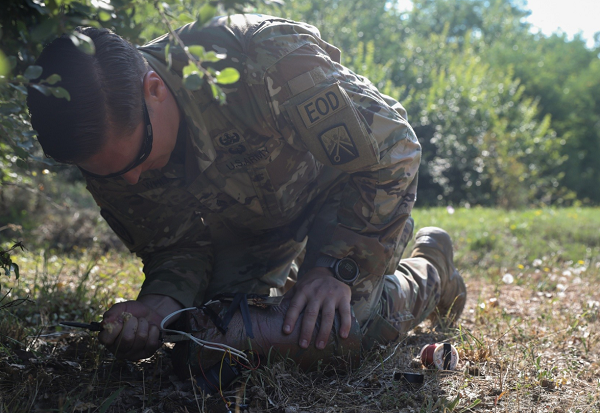
Explosive Ordnance Disposal (EOD) Officers are responsible for commanding operations during combat.
Explosive Ordnance Disposal professionals are responsible for disposing of ordnance, using robotics to check on potential threats, and providing protection for those around them.
They advise on any potential threats and coordinate ordnance employment for lower levels.
Training required to become an EOD Officer includes attending the Ordnance Officer Basic Course for 16 weeks, in addition to 20 weeks of advanced training.
EOD Officers must have self-discipline.
Their role requires a civilian driver’s license, normal color vision, remaining eligible for a Top Secret Clearance, and having no allergies to explosives or their components.
The Enlisted comparison, EOD (89D), is equally as dangerous with similar job duties of performing ordnance disposal and identification.
The largest difference between the EOD Enlisted role and the EOD Officer role, is that Officers complete more work in coordinating operations and advising commanders, while Enlisted EOD will participate in more hands-on procedures.
Working in EOD translates to a job as an Explosive Worker or Ordnance Handling Expert as a civilian.
According to the Bureau of Labor Statistics, the mean annual wage for an Ordnance Handling Expert was $56,670 in 2022.
#6. Air Defense Artillery (ADA) Officer (14A)
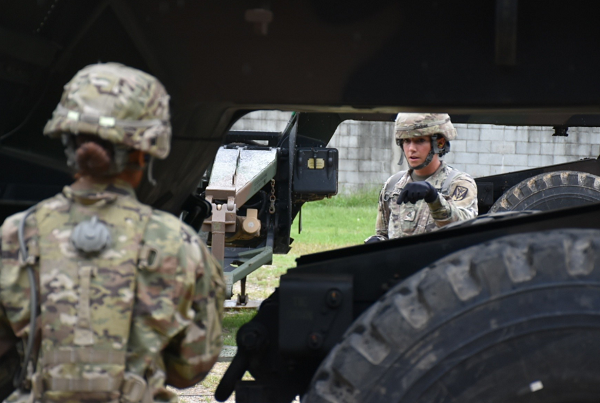
ADA Officers are technical experts in managing complicated air defense systems.
The systems that they manage are responsible for providing communication, warning, detection, and protection from aerial attacks.
These attacks can be aerial attacks, missile attacks, or aerial surveillance.
ADA Officers are required to become an expert in either: the Patriot/THAAD missile system, the AVENGER and Counter-Rocket, command/control computer systems, mortars, or the Artillery (C-RAM) Systems/components.
To become an ADA Officer, Soldiers must complete the Air Defense Artillery Officer Basic Course.
Enlisted Air Defense Battle Management System Operator (14G) closely relates to the ADA Officer position.
Both positions require Soldiers to maintain and manage complex computer systems, equipment, and radar.
While both the Officer and Operator roles have similar job functions, the Officer role will involve more coordination of targets, evaluation of intelligence, and strategy determination.
The extensive training on manipulating computer/electronic systems provides the ability to have a stable career as an Electrical or Electronics Engineering Technician as a civilian.
The median pay for this position was $64,640 in 2022 according to the Bureau of Labor Statistics.
Related Article – Military Jobs: A List Of All 512 Jobs in the US Military
#5. Special Forces Officer (18A)
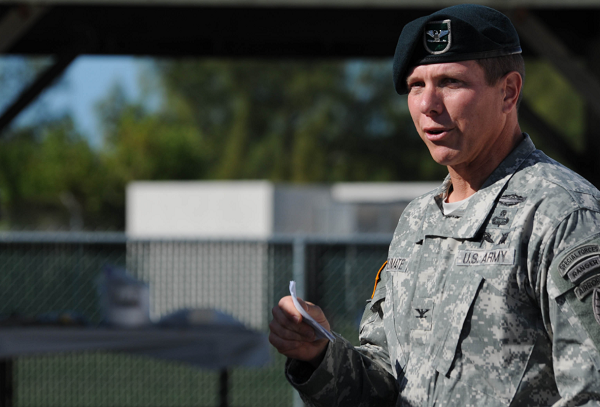
One of the most difficult Army officer jobs is in the special forces realm.
Special Forces Officers are team leaders and planners.
They are the ones who lead teams in various missions from counter-terrorism to special reconnaissance.
Their tasks include intelligence gathering, training military forces, and responding to terrorist activities.
Special Forces Officers work closely with both U.S. and foreign governments.
This role requires individuals to be trained in many areas.
Officers must attend both airborne training and the Special Forces Qualification Course in addition to multiple other training courses.
The Special Forces Candidate (18X) is an Enlisted position similar to the Officer position.
In this role, soldiers will choose from weapons, engineering, medical, or communications.
Both the Officer and Enlisted positions have extensive training that is required.
They need to be an expert in a wide variety of areas and one of the most physically fit as well.
Training is extremely hard to complete and only the most dedicated do so.
Differences between the roles surround being a team leader and team member.
While they will complete similar missions, the Officer is the team leader and is responsible for planning logistics, keeping up with resources, and training individuals.
Enlisted members will be team members and complete missions with the guidance of the Officer.
This is a top Army position because it provides leadership skills, training and professional development, airborne skills, parachuting, and logistics.
Working as a Training and Development Manager will provide a median pay of $120,130 per year according to the US Bureau of Labor Statistics in 2021.
#4. Chemical, Biological, Radiological, and Nuclear (CBRN) Officer (74A)
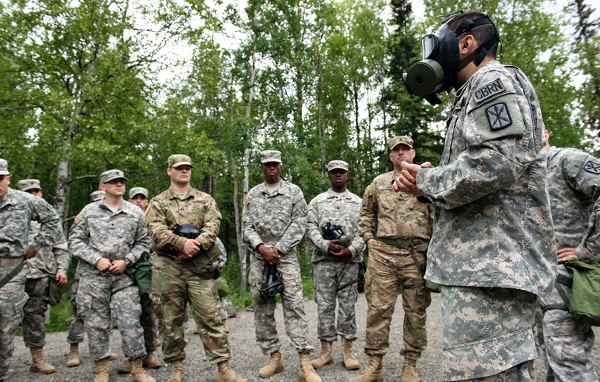
Number 4 on our list of the best Army officer jobs is in the CBRN field.
CBRN Officers have the important job of leading the unit that protects our nation against CBRN attacks and Weapons of Mass Destruction.
They serve as battalion CBRN Officers.
CBRN Officers command operations and become familiar with defense procedures.
Officers coordinate the employment and training of CBRN Soldiers.
Training for this role requires completing the CBRN Basic Officer Leaders Course Phase III, toxic agent training, and earning a HAZMAT Operations Certification from the Department of Defense.
CBRN Specialists (74D) are in a similar Enlisted role.
They work on teams supervised by Officers with similar tasks, including training civilian personnel on response operations and assisting with establishing CBRN defense measures.
The difference between the Officer and Specialist roles include the requirement of Officers to be Battalion leaders, commanding duties, and employment coordination.
CBRN Officers are provided with training that can lead to civilian chemist or disposal specialist positions.
According to the US Bureau of Labor Statistics in 2021 the median pay for a Chemist was $79,760.
Related Article – 11 General Order For Each Military Branch
#3. Military Intelligence Officer (35A)
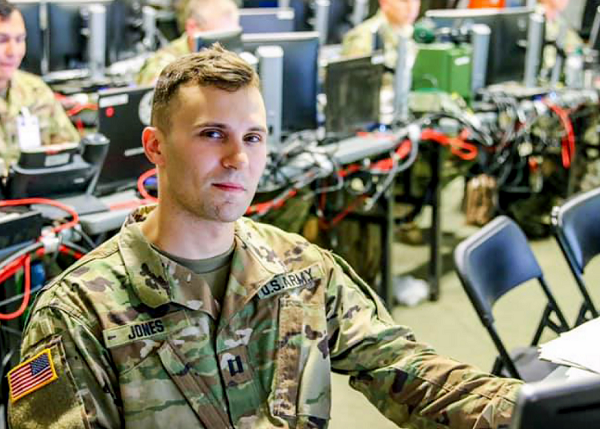
Army Military Intelligence Officers collect intelligence during Army missions.
They are highly trained and specialize in one of six areas.
Specialized areas include Imagery Intelligence, All-Source Intelligence, Counterintelligence, Human Intelligence, Signals Intelligence/Electronic Warfare, and All-Source Intelligence Aviator.
Depending on the area of specialty, these Officers are tasked with commanding Military Intelligence Soldiers and coordinating armed forces.
They assess risks and make critical decisions regarding action on threats.
Officers must become experts in the intelligence systems they use.
Training for this role includes attending the Military Intelligence Officer Basic Course.
There are several in-demand Enlisted positions that are similar to this Officer role.
Human Intelligence Collector (35M), Signals Intelligence Analyst (35N), Cryptologic Linguist (35P), and Human Intelligence Collector (35M) are all Enlisted positions currently in demand.
These roles are similar to the Officer position because of the job duties assigned.
Both the Officer and Enlisted personnel are charged with collecting and analyzing data.
Officers have more administrative tasks and are responsible for training, manning personnel, and communicating with Commanders.
As an officer, you can gain valuable experience as an investigator.
According to the US Bureau of Labor Statistics the 2021 median salary for Investigators was just above $59,000.
#2. Transportation Officer (88A)
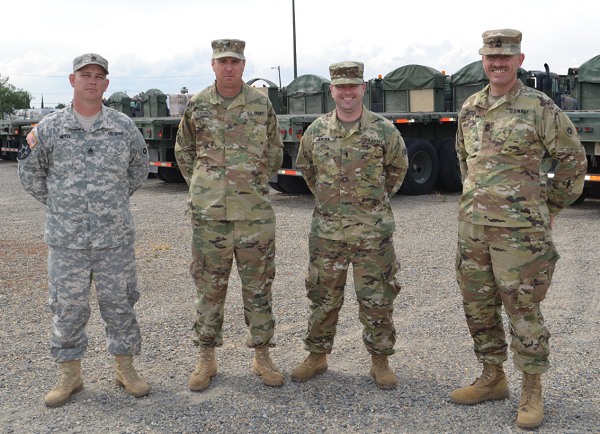
Transportation Officers are the ones on the road ensuring supplies, troops, and equipment get where they need to be at the time they are needed to be there.
They provide support to the people on the front lines.
Experts in systems and vehicles, Transportation Officers coordinate all movement procedures for moving trucks and supplies.
Training includes completing the Transportation Basic Officer Leader Course where Officers learn maintenance, operational aspects, and leadership skills.
Enlisted MOS 88M Motor Transport Operator, is an in-demand position that is similar to the Transportation Officer.
Motor Transport Operators and Transportation Officers provide mobility support to troops.
Both are involved in the transportation of products for the Army and operating wheel vehicles.
While both can have supervisory duties, Officers have additional leadership responsibilities and employment coordination tasks> They are also responsible for controlling transportation operations during combat.
Working as a Transportation Officer is one of the best Army jobs because of the civilian career opportunities available after you complete service.
Transportation Officers can work as mechanics, heavy truck drivers, dispatch, operational managers, and logistics managers.
In 2021 Logisticians made a median salary of $77,000 according to the US Bureau of Labor Statistics.
Related Article – Explosive Ordnance Disposal (EOD) Technician: Career Details
#1. Psychological Operations Officer (37A)
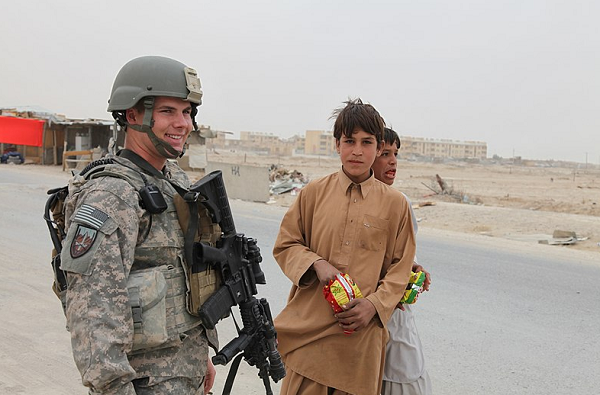
Lastly, one of the best Army officer jobs to have is in the Psychological Ops field.
Army Psychological Operations Officers are experts in the art of persuasion.
They use a variety of techniques to influence and persuade a group of people.
These Officers must be familiar with the culture and political trends in the area they are operating in.
Psychological Operations Officers will use different campaigns in order to influence a particular thought pattern or behavior from a select group of individuals.
Skills required in this position include de-escalation in tactical and professional environments, communication with leaders of foreign and local entities, as well as extensive planning skills.
To become a Psychological Operations Officer you must complete the Psychological Operations Officer Qualification Course where PSYOP skills will be developed.
The enlisted Psychological Operations Specialist (37F) has similar job functions.
Both are influence experts and use social psychology to create messaging for targeted audiences.
Officers, as with all other officer positions, will lead groups of specialists, complete training, and communicate with Commanders.
This MOS is rated at the top of the list because of the job outlook for civilian Psychologists.
In 2018 civilian Psychologist had a median wage of almost $80,000 a year, according to the US Bureau of Labor Statistics.
In addition, the US Bureau of Labor Statistics stated that the job outlook for this career is expected to increase by 6% between 2018 and 2028.
Conclusion
Selecting an Army job is a difficult decision that can have a lasting impact on both your Military career and personal life.
Thinking ahead and planning what will make you successful as a soldier, but also a civilian, will you set you up for long-term success.
The best Army Officer jobs listed above have civilian jobs that use the skills learned.
Overall, a career as an Officer will provide you with steady pay and leadership skills, desirable by civilian employers everywhere.
Related Article – Army Helicopter Pilot Requirements
- Ikon Pass Military Discount: Learn How To Save Big - January 31, 2025
- RTIC Military Discount: Find Out How To Save Big on Gear - January 30, 2025
- Traeger Military Discount: Learn How To Save Big on Smokers - January 28, 2025

